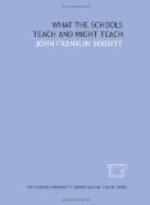In the new so-called English course in the academic high schools required foreign languages are omitted entirely. In the third and fourth years German or Spanish is made elective. This gives rise to several questions. If the foreign language is studied simply as preparation for the leisure occupation of reading its literature—the only value of the course in the case of most who take it—why should not French be elective also? By far the largest of the world’s literatures, outside of the English, is the French. The Spanish has but a small literature; and while Germany has excelled in many things, belles-lettres is not one of them. Another question relates to the placing of these electives. If one is to study a foreign language at all, it is usually thought best to begin earlier than the third year of the high school, so as to finish these simple matters that can be done by children and gain time in the later years for the more complicated matters that require mature judgment.
DIFFERENTIATION OF COURSES
Courses of training based upon human needs should be diversified where conditions are diversified. Uniform courses of study for all schools within a city were justifiable in a former simpler age, when the schools were caring only for needs that were common to all classes. But as needs have differentiated in our large industrial cities, courses of training must also become differentiated. In Cleveland this principle has been recognized in organizing the work of the special schools and classes. For all the regular elementary schools, however, a uniform course of study has been used. Under the present administration, principals and teachers are nominally permitted wide latitude in its administration.
A large part of this freedom is taken away by two things. One is the use by the city of the plan of leaving textbooks to private purchase. For perfectly obvious reasons, so long as textbooks are privately purchased, a uniform series of textbooks must be definitely prescribed for the entire city. Uniform textbooks do not necessarily enforce a uniform curriculum. In usual practice, however, they do enforce it as completely as a prescribed uniform course of study manual. As the schools of different sections of the city are allowed to experiment and to develop variations from the course of study, they should be allowed greater freedom in choosing the textbooks that will best serve in teaching their courses.




